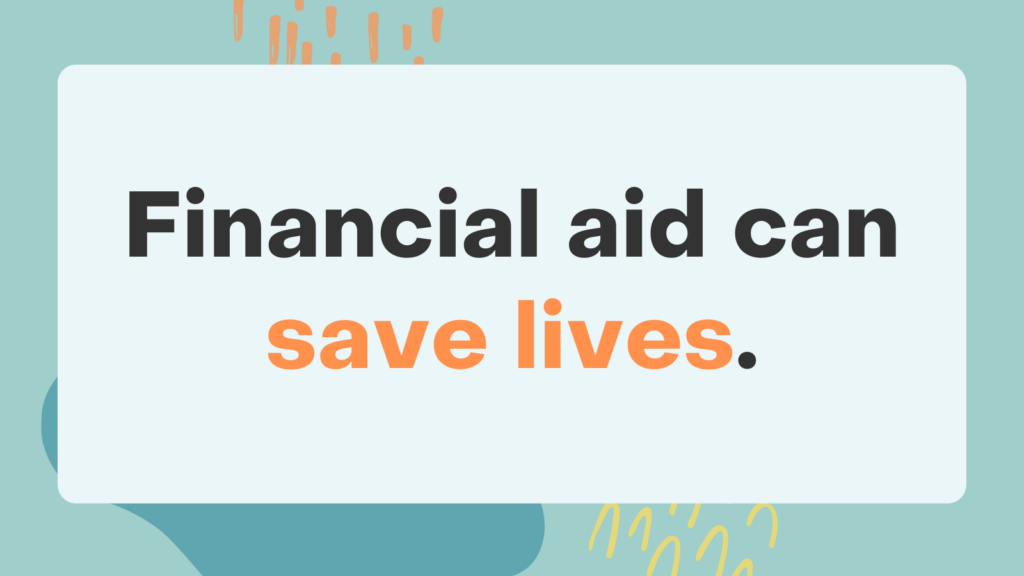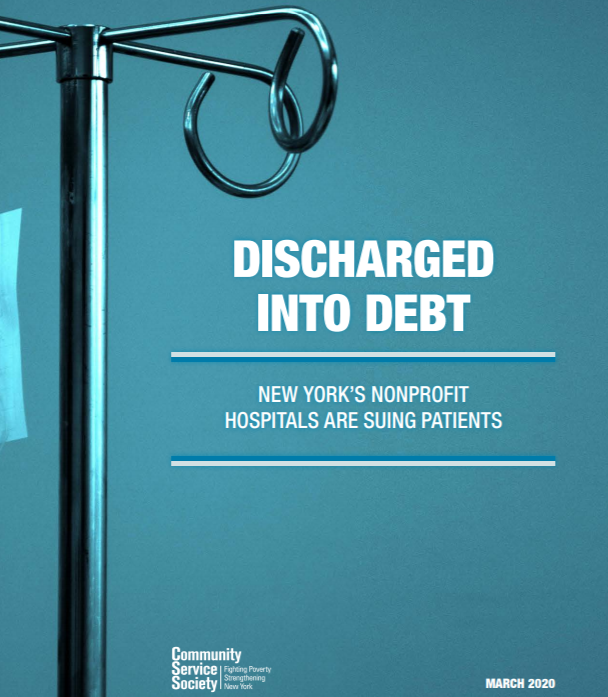Today, an extraordinarily diverse group of 61 organizations representing patients, religious leaders, labor organizations, people who are older, have disabilities, immigrants and people of color and more sent a letter to Majority-Leader Andrea Stewart-Cousins and Speaker Carl Heastie calling on elected officials to include the Ounce of Prevention Act (S1366 (2023) | A8441A (2022)) in the final State budget. The bill would reform the state’s Hospital Financial Assistance Law, enabling much-needed support to low-income families burdened by medical debt.
The letter is part of a united effort to end medical debt in New York state. You can show your support through our Phone2Action tool here.
Six percent of New Yorkers have been put into collections over medical bills, with numbers much higher for people of color in parts of the state. Nonprofit hospitals have sued more than 54,000 patients over medical debt they are unable to pay.
Many hospitals fail to offer meaningful financial assistance to their patients, despite receiving $1.1 billion dollars annually in state and federal funding to provide uncompensated care. Still others secure these funds despite failing the New York State Department of Health’s annual audits of their financial aid policies.
The Ounce of Prevention Act would add crucial patient protections to the existing Hospital Financial Assistance Law and increase the number of patients eligible to receive discounted care.
A copy of the letter can be found here.

By Bob Cohen, Policy Director, Citizen Action New York

The COVID-19 pandemic is exposing just how broken the US health care system is, including our inability to control disease outbreaks when many people simply cannot afford basic medical care. Patients should never fear seeking medical care because of cost, but for many New Yorkers that is the reality. And a new report by the Community Service Society highlights one of the worst outcomes for patients who cannot pay their medical bills – lawsuits filed against them by the hospitals they turned to for help. The report, “Discharged Into Debt,” finds that New York hospitals have filed over 30,000 debt collection lawsuits in the past five years. The study only looked at hospitals in 26 of New York’s 62 counties – which means the actual number of lawsuits is much higher.
New York State’s non-profit hospitals have a social mission. Legally, they are charities that pay no federal, state or local taxes and receive a total of $1.1 billion each year from the ICP. As a condition for receiving this funding, hospitals are required to offer financial assistance to patients without insurance.
The report, based on an examination of the New York State Ecourts public database and a sample of hundreds of individual case files, documented a number of abusive practices by New York hospitals. For example, hospitals claimed in legal papers that they were entitled to payment for unspecified items like “miscellaneous” and “ancillary procedures” charges. And, because New York allows hospitals to charge an outrageous 9% interest rate on outstanding bills and to tack on court fees on top of that, the median amount the hospital sued on was $1,900 but the median judgment amount was $2,300. In many cases, hospitals sued patients that were eligible for financial assistance without offering it, as required by law.
The report also found large racial disparities in the treatment of patients that owe medical debt, particularly upstate. In counties like Onondaga (Syracuse), Monroe (Rochester), Albany and Erie (Buffalo), a much higher proportion of people were referred to collections for medical debt in communities of color than white communities.
And, the study documents, patients were almost always totally outmatched by large collection law firms retained by the hospitals. Process servers often illegally serve relatives or co-tenants instead of patients, violating basic provisions of the U.S. constitution and in state laws designed to make sure people have reasonable notice of lawsuits so they can adequately defend themselves. And, 97% of the patients in the study were unrepresented and didn’t even attempt to respond to the lawsuit. The result is often wrecked credit, and unpaid judgments that threaten the financial futures of consumers and their families.
The CSS report adds to the case for passage of the Patient Medical Debt Protection Act (A.8639/S.6757), which addresses some of the most egregious medical billing practices. Fixing these practices, including lawsuit abuses, is a critical step in fixing our broken health care system and making health care affordable to low and moderate income New Yorkers.

Post by Bob Cohen, Policy Director, Citizen Action of New York
A hospital stay can be among the most stressful events in the life of many people. And for some, the stress can continue after you are discharged – due to the simple fact that all too many hospitals simply are unable to present you with a clear bill telling you what you owe. This can lead to months or even years of phone calls, letters and emails to resolve the dispute, and other consequences like collection lawsuits and wrecked credit.
When you buy a new refrigerator, you generally get a single bill at the store: not one bill for the refrigerator when you buy it, and six months later, for the ice tray. Not so with hospitals. As HCFANY’s new publication, Patients Need Clear Hospital Bills – Not the Runaround! says, all too many patients “receive bills months after their visit, or from doctors or other providers not affiliated with the hospital or who the consumer didn’t remember seeing … Many consumers don’t contest questionable hospital charges and just give up.”
New state legislation known as the Patient Medical Debt Protection Act (A8639/S6757), lead sponsored by Assembly Health Committee chair Richard Gottfried and Senate Health Committee chair Gustavo Rivera, Finance chair Senator Liz Kreuger, and Insurance chair Neil Breslin, addresses the hassles consumers face due to unclear and deceptive hospital bills. The legislation requires that consumers get a single consolidated, itemized bill or statement from the hospital detailing the specific services the patient received during their hospital visit and what you actually owe (vs. your health insurer) within seven days of their discharge or at their request. And the charges would have to be based on standard price data for procedures like a hip replacement.
This critical omnibus legislation addresses a number of other consumer problems with hospital bills, like high interest rates on amounts owed, and large “facility fees” – charges added to bills that do not represent medical services. HCFANY will be campaigning hard to get this legislation passed in 2020. Visit this page for ideas on how you can help: https://wethepatientsny.org/wtp_campaigns/one-visit-one-bill/!

New Yorkers were protected from $400,000,000 in unfair, out-of-network bills between 2015 and 2018 because of our surprise bill law. New York passed the law in 2015 after the state received hundreds of complaints over the years from people who had done everything they could to use in-network providers, but still ended up with huge bills.
The law is especially effective for people being billed for emergency services. Providers cannot bill patients for out-of-network emergency services that the patient could not avoid. Neither the provider nor the plan may charge patients for services in excess of the deductible, copay, or coinsurance amounts they owe according to their plan agreement. Patients are also protected in non-emergency situations when they are at an in-network hospital or ambulatory center and there is no in-network physician available, they are taken care of by an out-of-network provider without their knowledge, or an unforeseen medical issue arose that required unplanned medical care.
The patients’ insurance company and the provider have to figure it out without involving the patient whatsoever. In New York they do that through a third-party in a process called independent dispute resolution (similar to baseball arbitration). The law not only helps patients avoid unfair bills, it helps keep insurance premiums down because the dispute resolution process prevents insurers from having to pay excessive charges. And now that this process is in place, providers working in hospitals have more incentive to join insurance networks and work out a system of payment through a regular network agreement. That means fewer surprise bills overall.
Our surprise bill law is missing some pieces. One of the most common types of surprise bills occurs after patients have been told by their plan and provider that the provider is in-network. If that information is wrong, the patient has no recourse. New York can fix that during this year’s legislative session.
Another problem is that states can only regulate some plans. Self-funded plans, which are usually plans people get through employment at very large companies, can only be regulated by the federal government. DFS recently required insurance companies to include what type of plan you have on every insurance card, which will help. The law also might not help you if your plan was issued outside of New York. New York has great regulators that do everything they can to protect consumers – but we need to make sure we have leaders in Washington that also care about patients and access to health care.
What should you do if you have a surprise bill? Ask for help! It can be hard for people to know if the law covers their bills or not. Community Health Advocates is a state program that connects you to counselors who can help figure it out – for free, and regardless of what insurance you have (if any). The counselors look at medical bills every day, so they can save you a lot of time – and maybe a lot of money! Their helpline number is 212-614-5400.
